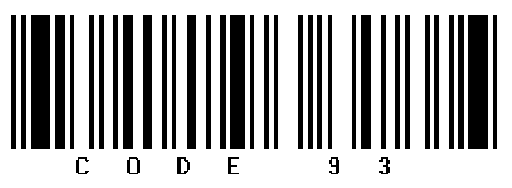
The Code 93 barcode is a variable-length, alphanumeric, self-checking 1D barcode with an optional checksum for error detection. Code 93 was developed to improve data density and integrity in comparison to Code 39.
The following example barcode encodes the information "CODE 93" as an Code 93 barcode:

Code 93 only includes the uppercase alphabetic characters. Code 93 also includes the characters space " ", minus "-", plus "+", period ".", dollar sign "$", slash "/", and percent "%".
Code 93 derives its name from the fact that every character is constructed from 9 modules arranged into 3 bars with their adjacent spaces.
Code 93 requires a quiet zone, which should be at least the width of 10 narrow bars. This means that if you set the MinimumBarWidth property to 3 pixels (narrow bar size), you should set the HorizontalWhiteSpace property to 30 pixels.
Code 93 requires a quiet zone, which should be at least the width of 10 narrow bars. This means that if you set the MakeBarcodeBarSize property to 3 pixels (narrow bar size), you should set the MakeBarcodeBWidth property to 30 pixels
Code 93 requires a quiet zone, which should be at least the width of 10 narrow bars. This means that if you set the MinimumBarWidth property to 3 pixels (narrow bar size), you should set the HorizontalWhiteSpace property to 30 pixels.
Code 39 is also referred to as "Code 3 of 9".
Code 39 Extended is a variant of Code 39 which extends support to the full ASCII charcter set. Code 32 is another variant that supports a subset of Code 39 characters.
Code 93 barcodes were designed to increase data density and integrity in comparison to Code 39 symbology.
For more information, see the Barcode Xpress SDK product page or try our online demos.